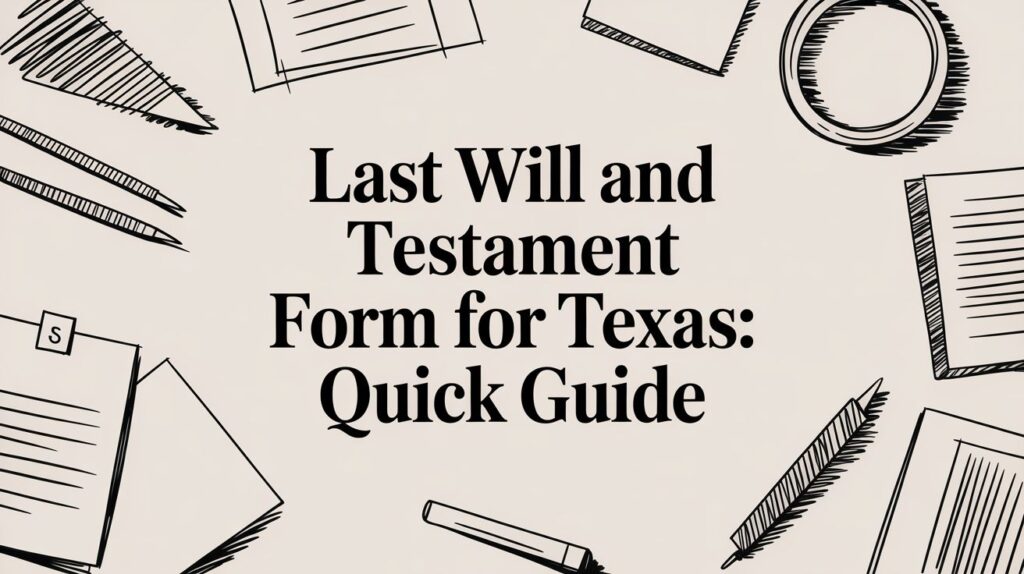When handling the estate of a deceased loved one, one of the most common questions that arises is: must probate applicant be a resident of Texas? The probate process can be complex, and understanding who can file for probate is essential for ensuring the smooth transfer of assets, settling debts, and carrying out the final wishes of the deceased.
If you’re dealing with an estate in Texas but don’t live in the state, you may be wondering whether residency is required to file for probate. The short answer? No, the probate applicant does not have to be a resident of Texas. However, specific legal requirements and challenges may arise when an out-of-state executor or administrator handles a Texas estate.
In this guide, we’ll explore who can file for probate in Texas, whether residency matters, the role of an executor or administrator, and how non-residents can successfully navigate the process.
Understanding Probate in Texas
Before diving into whether the probate applicant must be a Texas resident, it’s crucial to understand what probate is and why it matters.
Probate is the legal process of distributing a deceased person’s estate, which includes verifying a will (if one exists), paying outstanding debts, and transferring assets to heirs or beneficiaries. In Texas, probate is required in most cases where the deceased owned property solely in their name without a designated beneficiary.
If there is a valid will, probate allows the executor named in the will to legally manage and distribute the estate. If there is no will, the court appoints an administrator to handle the estate under Texas intestate succession laws.

Who Can File for Probate in Texas?
The Texas Estates Code outlines specific rules about who can apply for probate. The probate applicant, whether an executor or administrator, does not have to be a Texas resident, but certain conditions must be met.
1. Executor Named in the Will
If the deceased left a valid will, the person named as the executor (also known as the personal representative) has the right to file for probate in Texas. The executor:
- Does not have to be a Texas resident
- Must be at least 18 years old
- Must be of sound mind and not convicted of a felony
- Must follow the instructions laid out in the will
If the executor named in the will is an out-of-state resident, they can still file for probate in Texas, but they may need to appoint a local agent for service of process (a person or attorney based in Texas to accept legal documents on their behalf).
2. Heirs or Beneficiaries When No Executor is Named
If there is no will or if the named executor is unable or unwilling to serve, the court will appoint an administrator. Typically, the following individuals can apply for probate:
- The spouse of the deceased
- Adult children of the deceased
- Other heirs or beneficiaries named in the will
- A creditor of the estate (if debts need to be settled)
Even if the person applying for probate is not a Texas resident, they can still be appointed as an administrator if the court determines they are qualified. However, additional requirements—such as appointing a Texas-based agent—may apply.
3. Court-Appointed Administrators
When there is no will or qualified family member to handle the estate, the court may appoint a neutral third party to act as the administrator. This person is usually a Texas-based attorney, trustee, or professional executor who ensures the estate is properly managed.
Does the Probate Applicant Have to Be a Texas Resident?
The Texas Estates Code does not require the probate applicant to be a resident of Texas. However, non-resident executors or administrators must comply with specific legal requirements to serve in this role.
Here’s what non-residents need to know:
- A non-resident executor can file for probate in Texas but may need to designate a local agent for service of process (a Texas-based person or attorney who can receive legal notices).
- The court may require a bond for non-resident applicants to ensure they properly handle the estate.
- If an out-of-state executor fails to perform their duties, the court has the authority to remove them and appoint a new administrator.
While being a Texas resident is not a requirement, courts tend to favor local applicants when appointing an administrator, especially when the estate is large or complex.
Challenges for Non-Resident Probate Applicants in Texas
Although Texas allows non-resident probate applicants, those living outside the state may face certain challenges, including:
1. Travel Requirements
Non-resident executors may need to travel to Texas multiple times for:
- Attending probate hearings
- Managing estate property or assets
- Handling disputes or legal issues
This can be costly and time-consuming, especially for large estates that take months to settle.
2. Difficulty Managing Local Assets
If the estate includes real estate, bank accounts, or businesses in Texas, handling these assets remotely can be challenging. Executors may need to:
- Work with local attorneys and financial professionals
- Hire a property manager to oversee real estate
- Communicate with Texas banks and creditors
Failure to manage assets properly can lead to legal disputes or financial loss for the estate.
3. Legal Complexities and Additional Costs
Non-resident probate applicants may need to:
- Appoint a Texas-based agent for legal matters
- Pay a bond or surety fee as required by the court
- Hire a Texas probate attorney to assist with legal filings
These additional steps can increase the overall cost and complexity of probate.

How to File for Probate as a Non-Resident in Texas
If you’re a non-resident who needs to file for probate in Texas, it’s essential to understand the legal requirements and procedural steps to ensure a smooth probate process. While Texas law allows out-of-state applicants to serve as executors or administrators, non-residents must comply with additional legal conditions. By following the right steps, you can efficiently manage the estate while avoiding unnecessary delays and legal obstacles.
1. Consult a Texas Probate Attorney
A local probate attorney plays a crucial role in helping non-residents navigate the Texas probate system. An attorney will guide you through court filings, deadlines, and procedural requirements, ensuring that you comply with state laws. Texas has specific probate rules, and an experienced lawyer will help you avoid mistakes that could delay the process or lead to unnecessary disputes.
Hiring a Texas-based probate attorney is particularly important if the estate includes complex assets, outstanding debts, or contested inheritances. Additionally, a probate lawyer can act as your representative in court, which may reduce the need for frequent travel to Texas. This can save you time, money, and logistical complications, especially if you live in another state or country.
2. File the Application for Probate
The probate application must be filed in the Texas county where the deceased lived at the time of their passing. This step officially opens the probate case and notifies the court that you are seeking to administer the estate. If the deceased owned property in multiple counties, you may also need to file ancillary probate in additional jurisdictions to legally transfer ownership of assets.
After submitting the application, the court will schedule a hearing to formally recognize the executor or administrator. This is a critical step, as probate cannot proceed until the court grants official authority to manage the estate. Failing to file the probate application correctly can result in delays, additional legal expenses, and potential challenges from other heirs or creditors.

3. Appoint a Texas Agent for Service of Process
If you are an out-of-state executor or administrator, Texas law may require you to appoint a local agent for service of process. This is a Texas-based person or legal entity who can accept legal documents, notices, and court filings on your behalf. This requirement ensures that the probate process can proceed efficiently, even if you are not physically present in Texas.
A Texas-based attorney or professional executor often serves as the appointed agent, but you can also designate a trusted individual who resides in the state. Failing to appoint a service agent when required can result in delays, missed legal notifications, or potential legal disputes. Having a local agent helps facilitate communication with the court, creditors, and beneficiaries, ensuring that all legal obligations are met in a timely manner.
4. Attend Probate Hearings
As a non-resident applicant, you may be required to attend probate hearings in Texas. The frequency and necessity of in-person court appearances depend on the complexity of the estate, any contested issues, and local court procedures. Some cases, especially uncontested probate filings, can be handled remotely with legal representation from a Texas attorney.
If court appearances are required, you may need to travel to Texas multiple times to attend hearings related to:
- Validating the will (if applicable)
- Disputes over asset distribution
- Claims from creditors or other heirs
- Finalizing estate administration and closing probate
To minimize travel, your attorney can request virtual court appearances if allowed by the judge. Additionally, thorough preparation of legal documents can help streamline the process, reducing the number of necessary in-person hearings.
5. Fulfill Executor Duties
Once the court formally appoints you as the executor or administrator, you are responsible for managing the estate according to Texas probate laws. These duties include:
- Identifying and valuing estate assets, including bank accounts, real estate, and personal property
- Paying outstanding debts and taxes, ensuring creditors receive proper legal notification
- Distributing assets to beneficiaries in accordance with the will or Texas intestacy laws
- Filing the final estate tax return and closing accounts
Non-resident executors may face additional challenges, such as coordinating with local financial institutions, managing real estate transactions, and handling disputes from heirs or creditors. If you are unfamiliar with Texas laws, hiring a local probate lawyer, accountant, or estate planner can help ensure that all responsibilities are properly fulfilled.
The probate process in Texas can take anywhere from a few months to over a year, depending on the complexity of the estate. As a non-resident executor, staying organized and proactive will help you efficiently complete the process while ensuring that the estate is handled legally and fairly.
Final Thoughts: Who Can File for Probate in Texas?
So, must probate applicant be a resident of Texas? The answer is no—but non-resident applicants must follow certain legal requirements. While executors and administrators do not need to live in Texas, they may face challenges such as travel requirements, additional costs, and court-imposed conditions.
If you are an out-of-state executor, consider working with a Texas probate attorney to navigate the process effectively. Understanding the legal steps, responsibilities, and challenges will help ensure that the estate is settled efficiently and in compliance with Texas law.
By planning ahead and seeking legal guidance, non-resident probate applicants can successfully manage Texas estates and fulfill their duties without unnecessary delays.








